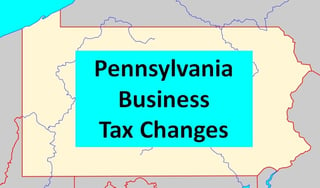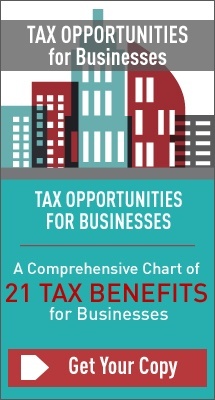 After long delays, Pennsylvania last month finally enacted its 2017-2018 state budget, which includes some significant tax changes for both businesses and individuals.
After long delays, Pennsylvania last month finally enacted its 2017-2018 state budget, which includes some significant tax changes for both businesses and individuals.
The following article covers some of the most significant revisions, including changes to Net Operating Loss deductions, tax changes for online retailers and a new deduction available to manufacturers.
The largest chunk of revenue being provided by this bill comes directly from the authorization of the Commonwealth to utilize annual payments from the Tobacco Master Settlement Agreement to issue bonds. This is estimated to generate $1.5 billion of revenue for the 2017-2018 fiscal year.
Read on for details on the most significant tax changes for both businesses and individuals:
Sales and Use Tax
The bill clarifies the provisions of Act 84 which imposed sales and use tax on digital downloads. Specifically, language was included to exclude separately billed support services. This includes things like help desk and call center support. If these services are not separately stated, and are bundled with other taxable canned software, then these services become taxable.
One of the larger pieces of the legislation revolves around sales tax collection and reporting on remote sellers which essentially refers to online retailers. The bill would require any remote seller or marketplace facilitator with aggregate sales of $10,000 or more in the previous calendar year to collect and remit sales tax or comply with reporting requirements.
This follows suite with several other states like Minnesota who are attempting to tap into the additional revenue that would be generated by collecting sales tax from online retailers like Amazon. However, this challenges the established law from Quill Corp. v. North Dakota in which the U.S. Supreme Court ruled that a state could not force a business to remit sales tax unless it had a physical presence in the state. It seems likely that these online retailers will challenge this law. This is effective February 1, 2018.
Another of the big changes of the bill relates to the Net Operating Loss deduction for corporate taxpayers. A recent ruling by the Pennsylvania Supreme Court has deemed the NOL deduction unconstitutional. House Bill 542 adjusts the NOL deduction as follows:
- Removes the $5 million annual cap
- Allows NOL deduction of 30% of taxable income for tax year 2017
- Allows NOL deduction of 35% of taxable income for tax year 2018
- Allows NOL deduction of 40% of taxable income for tax year 2019 and thereafter
The bill also provides for a deduction applicable to manufacturers making a capital investment in excess of $100 million for the creation of new or refurbished manufacturing capacity. The investment must take place within three years of a designated start date.
Within five years of the start date, the taxpayer must attest to the Department of Community and Economic Development (DCED) that the project is completed. The DCED will then determine the allowable deduction. This will be equal to 5% of the private capital investment and will be available for the five tax years immediately following the DCED’s decision. The deduction may not be transferred and will not allow the taxpayer to reduce its liability by more than 50%. The unused portion would expire at the end of that tax year where the 50% threshold is met.
READ MORE: The House and Senate Tax Bills: What Businesses Need to Know
Personal Income Tax
Contributions to an ABLE (Achieving a Better Life Experience) account are deductible for Pennsylvania personal income tax purposes. The bill also exempts undistributed earnings and distributions from an ABLE account. This will be effective October 31, 2017.
Entities making payments to non-residents that would be reported on a 1099-MISC would now be required to withhold on the payments if they are in excess of $5,000 in a calendar year. The state would also mandate an electronic filing requirement for all 1099-MISC forms for payees and all classes of PA source income. This will become effective 60 days from enactment.
Appeals Process
The new bill reduces the amount of time taxpayers have to file a petition for reassessment, review, or adjustment. An appeal must be filed within 60 days after the mailing date of the notice, down from 90 days. It also reduces to 60 days the amount of time a taxpayer has to appeal a Board of Appeals decision to the Board of Finance and Revenue. This is also reduced from 90 days.
Initially, the Department of Revenue was looking to reduce this number all the way down to a mere 30 days. However, the PICPA was instrumental in preventing this from occurring. The Department’s proposed 30 day limit would have created unnecessary challenges to both taxpayers and practitioners. The effective date is unclear, but practitioners and taxpayers alike should err on the side of caution and assume immediate enactment.
Miscellaneous Items
The date to apply for new Keystone Opportunity Zones (KOZ) has been extended from October 2016 to October 2018. Consequently, it also extends the date the DCED has to take action on these applications from December 2016 to December 2018.
A new fee on car sharing services will be created by the bill to aid in funding the Public Transportation Assistance Fund. This will apply to services such as Zipcar, but not to services like Uber and Lyft based on the current language.
Lastly, the bill allows for Pennsylvania residents to purchase consumer-grade fireworks from Pennsylvania fireworks stores. There is imposed on these sales a 12% tax, part of which will help fund emergency service funds.
Please contact me at hpietrouchie@concannonmiller.com or 610-433-5501 for any questions or personal assistance on any of these state tax changes.






